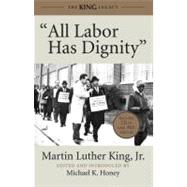
Dr. Martin Luther King, Jr. (1929-1968), Nobel Peace Prize laureate and architect of the nonviolent civil rights movement, was among the twentieth century's most influential figures. One of the greatest orators in U.S. history, King is the author of several books, including Stride Toward Freedom: The Montgomery Story, The Trumpet of Conscience, Why We Can't Wait, and Where Do We Go from Here: Chaos or Community? His speeches, sermons, and writings are inspirational and timeless. King was assassinated in Memphis, Tennessee, on April 4, 1968.
Michael K. Honey, a former Southern civil rights and civil liberties organizer, is professor of labor ethnic and gender studies and American history, and the Haley Professor of Humanities, at the University of Washington-Tacoma. The author of three books on labor and civil rights history, including Going Down Jericho Road: The Memphis Strike, Martin Luther King's Last Campaign, he lives in Tacoma.
| Introduction | p. xiii |
| Editor's Note | p. xxxvii |
| Forging a Civil Rights-Labor Alliance in the Shadow of the Cold War | |
| "A look to the future" | p. 3 |
| Twenty-fifth Anniversary of the Highlander Folk School, Monteagle, Tennessee, September 2, 1957 | |
| "It is a dark day indeed when men cannot work to implement the ideal of brotherhood without being labeled communist." | p. 19 |
| Statement of Martin Luther King and the Southern Christian Leadership Conference in defense of the United Packinghouse Workers Union of America, Atlanta, Georgia, June 11, 1959 | |
| "We, the Negro people and labor... inevitably will sow the seeds of liberalism." | p. 23 |
| Twenty-fifth Anniversary Dinner, United Automobile Workers Union, Cobo Hall, Detroit, Michigan, April 27, 1961 | |
| If the Negro Wins, Labor Wins | p. 31 |
| AFL-CIO Fourth Constitutional Convention, Americana Hotel, Miami Beach, Florida, December 11, 1961 | |
| "I am in one of those houses of labor to which I come not to criticize, but to praise." | p. 47 |
| Thirteenth Convention, United Packinghouse Workers Union of America, Minneapolis, Minnesota, May 21, 1962 | |
| "There are three major social evils...the evil of war, the evil of economic injustice, and the evil of racial injustice." | p. 55 |
| District 65 Convention, Retail, Wholesale and Department Store Union (RWDSU), Laurels Country Club, Monticello, New York, September 8, 1962 | |
| Industry knows only two types of workers who in years past, were brought frequently to their jobs in chains." | p. 65 |
| Twenty-fifth Anniversary Dinner, National Maritime Union, Americana Hotel, New York City, October 13, 1962 | |
| "Now is the time to make real the promises of democracy." | |
| Detroit March for Civil Rights, Cobo Hall, Detroit, Michigan, June 23, 1963 | |
| "The unresolved race question" | p. 87 |
| Thirtieth Anniversary of District 65, RWDSU, Madison Square Garden, New York City, October 23, 1963 | |
| Standing at the Crossroads: Race, Labor, War, and Poverty | |
| "The explosion in Watts reminded us all that the northern ghettos are the prisons of forgotten men." | p. 103 |
| District 65, RWDSU, New York City, September 18, 1965 | |
| "Labor cannot stand still long or it will slip backward." | p. 111 |
| Illinois State Convention AFL-CIO, Springfield, Illinois, October 7, 1965 | |
| Civil Rights at the Crossroads | p. 121 |
| Shop Stewards of Local 815, Teamsters, and the Allied Trades Council, Americana Hotel, New York City, May 2, 1967 | |
| Domestic Impact of the War in Vietnam | p. 137 |
| National Labor Leadership Assembly for Peace, Chicago, Illinois, November 11, 1967 | |
| Down Jericho Road: The Poor People's Campaign and Memphis Strike | |
| "The other America" | p. 153 |
| Local 1199 Salute to Freedom, Hunter College, New York City, March 10, 1968 | |
| "All labor has dignity." | p. 167 |
| American Federation of State, County and Municipal Employees (AFSCME) mass meeting, Memphis Sanitation Strike, Bishop Charles Mason Temple, Church of God in Christ, Memphis, Tennessee, March 18, 1968 | |
| To the Mountaintop: "Let us develop a kind of dangerous unselfishness." | p. 179 |
| AFSCME mass meeting, Memphis Sanitation Strike, Bishop Charles Mason Temple, Church of God in Christ, Memphis, Tennessee, April 3, 1968 | |
| Epilogue: King and Labor | p. 197 |
| Appendix: A Note on the Speeches | p. 201 |
| Acknowledgments | p. 207 |
| Index | p. 209 |
| Table of Contents provided by Ingram. All Rights Reserved. |
The New copy of this book will include any supplemental materials advertised. Please check the title of the book to determine if it should include any access cards, study guides, lab manuals, CDs, etc.
The Used, Rental and eBook copies of this book are not guaranteed to include any supplemental materials. Typically, only the book itself is included. This is true even if the title states it includes any access cards, study guides, lab manuals, CDs, etc.